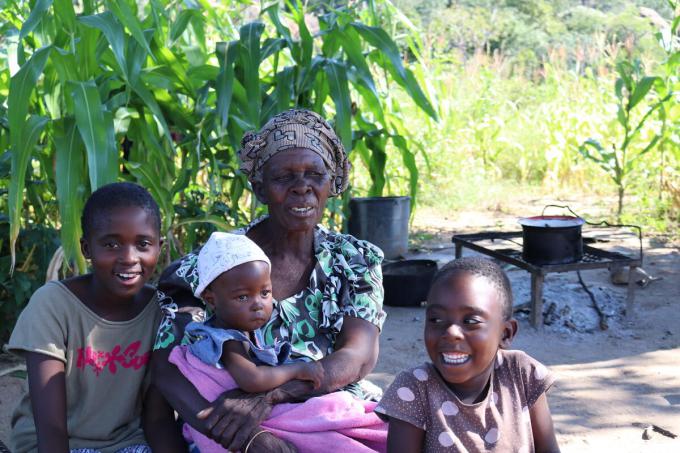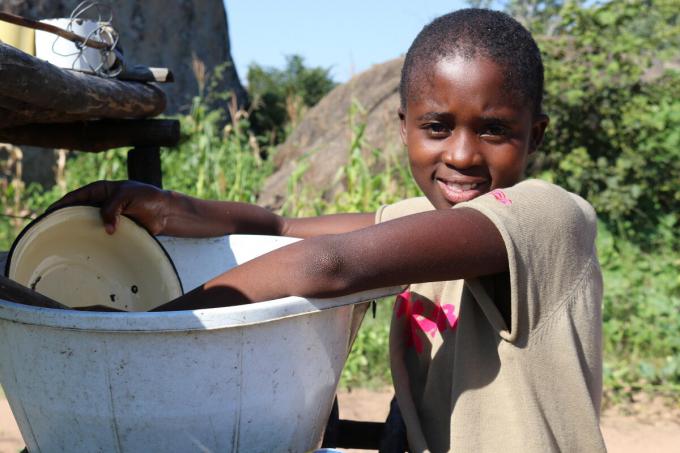Improving Lives through Cash Transfers
Sisters Nokwanda (10) and Khanyisiwe (4) are happy girls, as they are well fed and are able to have three meals each day. They are grateful for the USD65 that has been coming through their grandmother’s mobile wallet each month since September 2020. The mobile cash transfers have helped their 71-year –old Margaret to buy enough food, for their family throughout the peak hunger period.

Nokwanda and Khanyisiwe live with their grandmother, Margret, brother, Dylan (16) and cousin, Nondi (15 months), in a remote village located in Matobo district which lies in the southern part of Zimbabwe. Their mother left for neighbouring South Africa years ago and she only sends them groceries once a year. Their grandmother, Margret has had to bear the brunt of taking care of them and ensuring they are well fed, but she cannot do much because of her ill-health. The family’s livelihood mainly depends on farming and selling firewood. However, owing to low rainfall in their area, they did not harvest much to sustain them throughout the year.
Margret explains: “I have been living a life of struggle. I have been surviving on fetching firewood and selling it so that I get some money to buy food for my grandchildren. Most of the time, the money was never enough and it only enabled me to buy a 5kg bag of maize meal. I had no money to buy sugar and other food stuffs. At times I made 20 or 40 bond (Zimbabwean local currency, and USD1 is equivalent to approximately 100 bond) a day, after selling firewood to shop owners.”
“These past years have been dry years in this area. There were no rains, but we continued planting maize in our fields. Despite all my efforts I often used to get about three 50kg bags of maize. This was not enough for the year and we would run out of maize towards the farming season.”
“I have no cows, or chickens. I used to have some ten chickens but gave them away to my neighbour in exchange for maize meal. People would say give me 1 chicken and I give you 10kg of maize meal. I sometimes felt cheated but I had no option and had to trade my chickens for the maize meal.’’
Margret’s family is among the 982 vulnerable households receiving cash assistance in Matobo district. She says the cash transfer assistance came at the right time as she had run out of options. They now depended on hand-outs from neighbours. It was a difficult time for her and her grandchildren.
She utters: “After the chickens got finished, we survived entirely on pumpkins. I would cook pumpkin in the morning and eat with my grandchildren. I would cook pumpkin again in the evening, as I had no option. I would go around the village begging for pumpkins. Most villagers gave me many pumpkins and I would go and fetch them using a wheel barrow.”
“I’m am happy my family was chosen to get money from Save (Save the Children). The assistance came at the right time because we had nothing to eat.”
“When I receive the money, I usually buy a bag of maize meal, tea leaves, cooking oil, soya chunks and samp. I also buy soap. We now have enough to eat. I am also happy we received adequate rains and it looks like we will harvest enough to sustain us when the money programme ends.”
Well-fed Children are Happy Children
“My grandma buys us a lot of food. She gets money from Save (Save the Children) each month. Today we had tea, peas, and porridge with peanut butter and sugar. At noon we had sadza (thick maize meal porridge) and soya chunks, and grandma cooked for us. In the evening we usually eat sadza and cow pea leaf vegetables which we fetch from the field.” Nokwanda happily speaks as she washes dishes after their afternoon meal.

How we are Supporting Communities in Crisis
Through financial support from European Union Civil Protection Unit (ECHO), Save the Children in partnership with International Rescue Committee is implementing the Safe Multipurpose Assistance to Communities in Crisis (SMACC) project in five districts of Zimbabwe. The project started in September 2020 and ends in June 2021.
The project which is in response to food insecurity as well the COVID-19 pandemic is aimed at meeting the food needs and soap for handwashing of 23715 beneficiaries in Beitbridge, Matobo, Mbire, Chipinge and Chimanimani.
To date, six tranches of multipurpose cash transfers at USD 13.65 per beneficiary per month have been distributed firstly through physical cash from September to October 2020 and through mobile money from November 2020 till date. The project has also distributed COVID-19 Non-Food-Items such as handwashing stations, liquid soap, sanitizers, thermometers, social distancing materials, paints and rulers to schools and institutions in the district as part of COVID-19 response. Furthermore, the project has linked the beneficiary households to a European Union funded resilience and recovery strengthening intervention as part of the sustainability building.
 Zimbabwe
Zimbabwe